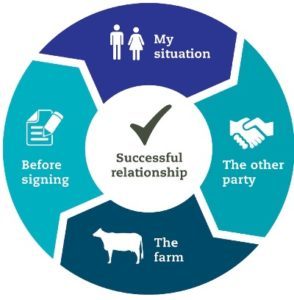Angie Fisher
Changing your role on the farm and sharing the responsibility of running it with a sharemilker or a contract milker is a big step for any farm owner.
As anyone who’s looked into sharemilking or contract milking will know, there are a lot of things to think about when setting up a successful new model for how things will run on your farm.
Fortunately, thousands of farmers across New Zealand have gone through the process. Talking with another farmer who’s had experience in these situations onfarm is a great way to get some advice on important issues.

Another option is to visit dairynz.co.nz/dairy-connect and they can put you in touch with a farmer who has experience with sharemilking or contract milking relationships to get their advice. As you’ll know, relationships are a two-way street and the first part of the process starts with deciding what you want to achieve.
Farmers are increasingly developing a vision for their property and setting out their approach to farming. If you haven’t already developed and written down your goals for your farm, now is a great opportunity to do this.
Once you are clear about your values, your purpose and what you want to achieve you can talk with prospective sharemilkers or contract milkers about what their views are.
Do their ideas about what is important fit with what you want to achieve and how you approach farming?
And what are the requirements that you can’t compromise on?
You can talk with sharemilkers and contract milkers about what’s important to you and to them. A walk around the farm is also a good opportunity to show them how you apply your ideas and get their thoughts on how they would operate the farm. And they’re likely to be more relaxed when out on the farm than in a formal interview – giving you a chance to get to know them better.
One of America’s most successful businessmen, Charles Koch talks about a great partnership being created when both parties have a shared vision and values and bring complimentary capabilities together. It’s worthwhile thinking about what skills and abilities the other party has, as well as what you offer – and how you can structure arrangements to draw on and develop both of your abilities.
Listen to their choice of words, as it can help you get a better understanding of how they think. If your ideas and theirs are similar, then you have a good chance of forming a successful farming operation together.
Farmers who have developed great working relationships with sharemilkers and contract milkers tell us that clear communication and guidelines about everyone’s responsibilities makes operating a farm much easier.
Having a robust contract and written farm policies are a good way to ensure that everyone knows what the expectations are for the future.
Using an up-to-date contract from Federated Farmers means you have an industry standard agreement developed by farmers for the current farming environment. DairyNZ also has some examples of farm policies which can help if you want to create or update these. Just type ‘farm policies’ into the search bar on DairyNZ’s website – dairynz.co.nz to find these.
Most farmers I speak to have plans to do their homework before entering into a new contract or business relationship. DairyNZ’s Do your homework webpage outlines a five-step process which can help you cover your bases and set up a successful relationship. It’s a great tool which includes advice on a wide range of topics like checking references and contracts. There is also a checklist online which makes it easy to work through the process. To find these resources visit www. dairynz.co.nz/homework.
Attracting experienced sharemilkers or contract milkers can be competitive. To find the right person you’ll want to make an offer which is attractive from their point of view.
Sharemilkers and contract milkers are taking on responsibility for the daily running of the farm, meeting health, safety, employment and environmental requirements (and more). What is the value of having someone who is experienced and trustworthy help with much of the running of your farm operation?
Progressing farmers are our future farm owners and will be looking for profitable businesses with the ability to build equity. They’ll also be looking at what else the farm offers – its productivity history, facilities, housing, location, the farm environment and what you’re like as a future business partner. So, think about what you and your farm have to offer and include this in adverts and interviews.
The time that you invest into choosing the right person, building a good relationship and setting out clear expectations for both parties will have a big impact on how well your farm operates in the future. It’s well worth spending the time building a solid partnership and doing your homework when for your farm’s future is at stake.
- Angie Fisher is a developer – farm business, DairyNZ.





